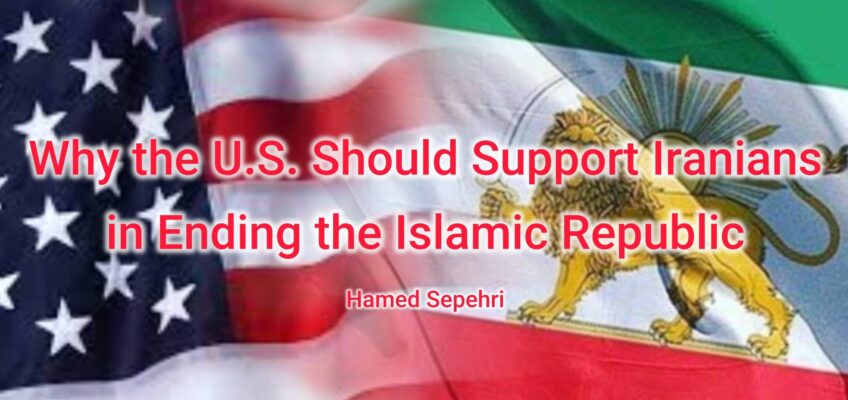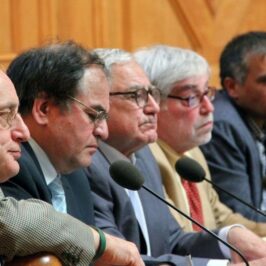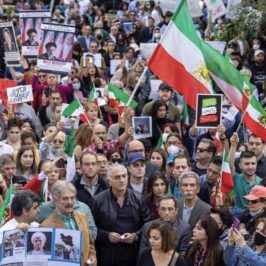For more than four decades, the Islamic Republic in Iran has been a destabilizing force in the Middle East, exporting extremism, suppressing its own citizens, and standing in direct opposition to U.S. interests and democratic values. Yet, beneath the surface of repression, millions of Iranians aspire to reclaim their nation’s proud history as a modern, progressive, and globally respected country. The United States has a moral and strategic opportunity: to stand with Iranians in their struggle for freedom and help pave the way for a stable, secular democracy—one envisioned under the leadership of Crown Prince Reza Pahlavi.
Critics often point to the failures in Iraq and Afghanistan as proof that U.S. involvement in Middle Eastern regime change inevitably leads to disaster. While the mistakes in those interventions were real—marked by poor planning, weak institution-building, and corruption—the core concept was sound: to free nations from tyranny and give people the chance at self-determination. Iran, however, is fundamentally different.
Unlike Iraq and Afghanistan, Iran possesses:
• Deep historical statehood with institutions and national identity stretching back millennia.
• A modern middle class educated and eager for integration with the global economy.
• A proven track record under the Pahlavi era of modernization, women’s rights, secular governance, and alignment with Western partners.
These factors provide the foundation for a far more successful democratic transition, if properly supported.
Before 1979, Iran under the Pahlavi monarchy was not perfect, but it was rapidly advancing toward becoming one of the most progressive nations in the world. Women had the right to vote, the economy was diversifying, and Iran enjoyed close ties with the West. Prince Reza Pahlavi, unlike autocrats who cling to power, has consistently advocated for a constitutional monarchy or democratic republic chosen freely by the Iranian people.
His vision is not about restoring absolute monarchy but about ensuring a secular, democratic framework rooted in Iran’s cultural identity. This offers an unparalleled chance for the U.S. to support an indigenous leader who commands respect among Iranians and the diaspora alike.
Helping Iranians rid themselves of the Islamic Republic is not only a moral imperative—it is a strategic necessity for Washington.
• Regional Stability: A democratic Iran would no longer sponsor terrorism, fund proxy wars, or destabilize neighbors from Lebanon to Yemen.
• Economic Opportunity: With vast energy reserves and an entrepreneurial population, Iran could become a hub of trade and investment, reducing global reliance on hostile petro-states.
• Geopolitical Leverage: A free Iran could serve as a democratic counterweight to authoritarian regimes in Russia and China, strengthening U.S. influence in Eurasia.
• Security Burden-Sharing: A stable Iran under a secular democracy could assume responsibility for maintaining Middle Eastern stability, allowing the U.S. to redirect military and diplomatic resources toward the Indo-Pacific, where the real long-term challenge—China—awaits.
The lesson from Iraq and Afghanistan is not to avoid supporting freedom, but to do it wisely:
• Back legitimate indigenous leadership like Prince Reza Pahlavi rather than imposing outsiders.
• Focus on institution-building—rule of law, independent judiciary, and anti-corruption measures.
• Support a transition roadmap that includes referenda, free elections, and international monitoring.
This approach would ensure that democracy in Iran is authentic, durable, and aligned with U.S. values.
The United States stands at a crossroads. It can either continue tolerating the Islamic Republic—a regime hostile to America, oppressive to its people, and destructive to regional order—or it can embrace the aspirations of the Iranian people for freedom and stability.
By supporting a secular democracy under the leadership of Prince Reza Pahlavi, Washington not only helps liberate 85 million Iranians but also secures a trusted partner capable of stabilizing the Middle East.
A free Iran would mean a stronger America, a safer Middle East, and a world better prepared to face the defining challenges of the 21st century.
ترجمه یادداشت:
چرا ایالات متحده باید از ایرانیان در پایان دادن به جمهوری اسلامی پشتیبانی کند – حامد سپهری
برای بیش از چهار دهه، جمهوری اسلامی در ایران نیرویی بیثباتساز در خاورمیانه بوده است؛ افراطگرایی صادر کرده، مردم خود را سرکوب نموده و در برابر منافع ایالات متحده و ارزشهای مردمسالارانه ایستاده است. با این حال، در زیر سطح سرکوب، میلیونها ایرانی آرزوی بازپسگیری تاریخ پرشکوه کشورشان را دارند؛ تاریخی که ایران را بهعنوان کشوری نوگرا، پیشرو و مورد احترام جهانی بازمینمایاند. ایالات متحده در برابر فرصتی اخلاقی و راهبردی قرار دارد: ایستادن در کنار ایرانیان در نبردشان برای آزادی و کمک به گشودن راهی به سوی یک مردمسالاری پایدار و سکولار ـ آنچنان که در چشمانداز شاهزاده رضا پهلوی ترسیم شده است.
منتقدان اغلب به ناکامیها در عراق و افغانستان اشاره میکنند و آن را دلیلی بر این میدانند که دخالت آمریکا در تغییر رژیم در خاورمیانه ناگزیر به فاجعه میانجامد. گرچه اشتباهات آن مداخلات واقعی بود ـ برنامهریزی ضعیف، نهادسازی ناکافی و فساد ـ اما اصل اندیشه درست بود: رهایی ملتها از استبداد و دادن فرصت تعیین سرنوشت به مردم. با این حال، ایران اساساً با عراق و افغانستان متفاوت است.
برخلاف عراق و افغانستان، ایران دارای این ویژگیهاست:
- دولتداری تاریخی عمیق با نهادها و هویت ملی کهن.
- طبقه متوسط نوین، تحصیلکرده و مشتاق پیوستن به اقتصاد جهانی.
- سابقهای اثباتشده در دوران پهلوی از نوگرایی، حقوق زنان، حکومت سکولار و همکاری با همپیمانان غربی.
این عوامل بنیانی محکم برای گذار مردمسالارانهای بسیار موفقتر فراهم میکند، اگر به درستی پشتیبانی شود.
پیش از ۱۹۷۹، ایران تحت سلطنت پهلوی کامل نبود، اما با شتاب به سوی یکی از پیشروترین کشورهای جهان شدن پیش میرفت. زنان حق رأی داشتند، اقتصاد در حال تنوعیابی بود و ایران روابط نزدیکی با غرب داشت. شاهزاده رضا پهلوی، برخلاف خودکامگانی که به قدرت میچسبند، همواره از مشروطهخواهی یا جمهوری مردمسالار که آزادانه توسط مردم ایران انتخاب شود، دفاع کرده است.
چشمانداز او نه بازگرداندن سلطنت مطلقه، بلکه تضمین چارچوبی سکولار و مردمسالار بر بنیاد هویت فرهنگی ایران است. این فرصتی بیمانند به آمریکا میدهد تا از رهبری بومی پشتیبانی کند که هم میان ایرانیان و هم در میان مهاجران ایرانی مورد احترام است.
یاری رساندن به ایرانیان برای رهایی از جمهوری اسلامی تنها یک ضرورت اخلاقی نیست ـ بلکه ضرورتی راهبردی برای واشنگتن است.
- ثبات منطقهای: ایران مردمسالار دیگر تروریسم صادر نخواهد کرد، جنگهای نیابتی را تأمین مالی نخواهد نمود و همسایگانش از لبنان تا یمن را بیثبات نخواهد ساخت.
- فرصت اقتصادی: با ذخایر عظیم انرژی و جمعیت کارآفرین، ایران میتواند به مرکز دادوستد و سرمایهگذاری بدل شود و وابستگی جهانی به دولتهای نفتی متخاصم را کاهش دهد.
- اهرم ژئوپولیتیکی: ایران آزاد میتواند وزنهای مردمسالار در برابر رژیمهای استبدادی روسیه و چین باشد و نفوذ آمریکا در اوراسیا را تقویت کند.
- تقسیم بار امنیتی: ایران باثبات و سکولار میتواند مسئولیت حفظ ثبات خاورمیانه را بر دوش گیرد و به آمریکا امکان دهد منابع نظامی و دیپلماتیک خود را به سوی هند-آرام، جایی که چالش بلندمدت واقعی یعنی چین در انتظار است، هدایت کند.
درس عراق و افغانستان این نیست که از پشتیبانی آزادی پرهیز شود، بلکه این است که باید خردمندانه عمل کرد:
- پشتیبانی از رهبری مشروع بومی مانند شاهزاده رضا پهلوی به جای تحمیل بیگانگان.
- تمرکز بر نهادسازی ـ حاکمیت قانون، قوه قضاییه مستقل و اقدامات ضد فساد.
- حمایت از نقشه راه گذار شامل همهپرسی، انتخابات آزاد و نظارت بینالمللی.
چنین رویکردی تضمین میکند که مردمسالاری در ایران واقعی، پایدار و همراستا با ارزشهای آمریکا باشد.
ایالات متحده در بزنگاهی تاریخی قرار دارد. یا میتواند به تحمل جمهوری اسلامی ادامه دهد ـ رژیمی دشمن آمریکا، ستمگر بر مردم خود و ویرانگر نظم منطقهای ـ یا میتواند آغوش خود را به سوی آرزوهای مردم ایران برای آزادی و ثبات بگشاید.
با پشتیبانی از یک مردمسالاری سکولار تحت رهبری شاهزاده رضا پهلوی، واشنگتن نه تنها به رهایی ۸۵ میلیون ایرانی یاری میرساند، بلکه شریکی قابل اعتماد برای برقراری ثبات در خاورمیانه به دست میآورد.
ایران آزاد به معنای آمریکایی نیرومندتر، خاورمیانهای امنتر و جهانی آمادهتر برای رویارویی با چالشهای سرنوشتساز سده بیستویکم خواهد بود.







دیدگاهتان را بنویسید